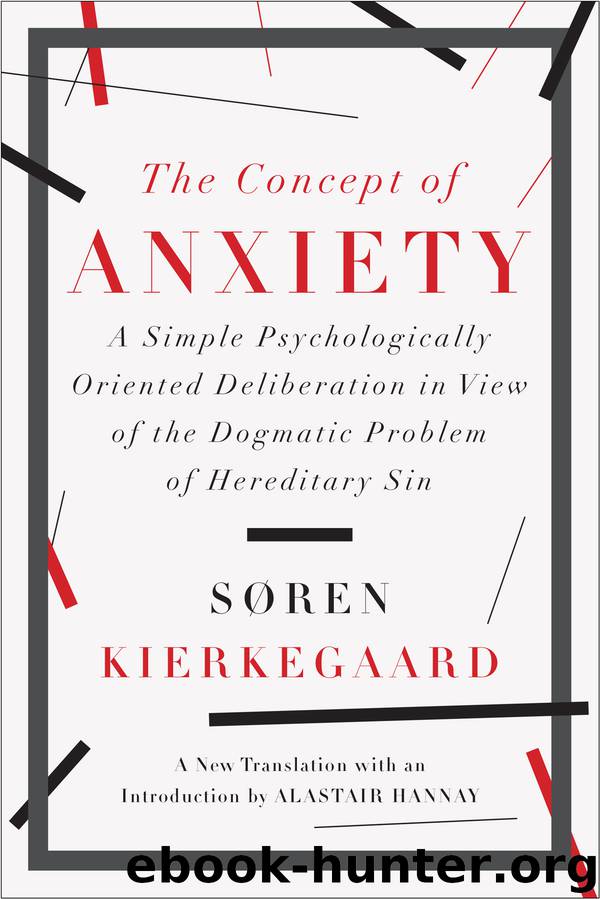The Concept of Anxiety by Soren Kierkegaard

Author:Soren Kierkegaard [Kierkegaard, Soren]
Language: eng
Format: epub
Publisher: Liveright
Published: 0101-01-01T00:00:00+00:00
§1
The Anxiety of Spiritlessness
A look at life will quickly convince one that, if what has been presented here is correct, namely that anxiety is the last psychological state from which sin breaks out in the qualitative leap, then the whole of paganism and its repetition within Christianity rests in a merely quantitative categorization from which the qualitative leap of sin does not break out. This state is not however that of innocence but is, when viewed from the standpoint of spirit, precisely that of sinfulness.
It is quite remarkable that Christian orthodoxy has always taught that paganism rested in sin, whereas it was Christianity that first posited sin. Orthodoxy is however correct when it explains itself more precisely. Paganism as it were stretches out time with quantifying attributes, never arriving at sin in the most profound sense, but this precisely is sin.
That this is true in the case of paganism is easy to demonstrate. With paganism within Christianity it is another matter. The life of Christian paganism is neither guilty nor not guilty; it recognizes no real distinction between present, past, future, the eternal. Its life and history proceed as writing went over the paper in those old days with no punctuation marks but with one word, one sentence, rubbing shoulders with the other. From an aesthetic point of view this is extremely comical, for while it is beautiful to listen to a running brook murmur through life, it is nevertheless comical that a sum of rational creatures be transformed into a perpetual and meaningless muttering. Whether philosophy can use this plebs [multitude] as a category by letting it be the substratum for something greater, just as a vegetative mess gradually becomes solid earth, first peat and then more, I do not know. From the standpoint of spirit such an existence is sin, and the least one can do for it is to say so and demand spirit of it.
What is said here does not, however, apply to paganism. Such an existence can only be found within Christianity. The reason is that the greater the height at which spirit is posited, the more profound the exclusion appears; and the higher their loss, the more wretched in their contentment are οἱ ἀπηλγηκότεϛ [those who are past feeling] (Eph. 4:19).* If the bliss of this spiritlessness is compared with the state of slaves in paganism, then there is some sense after all in slavery, because it is nothing at all in itself. The perdition of spiritlessness is on the other hand the most terrible thing of all, because the misfortune is precisely this, that spiritlessness has a relation to spirit, which is nothing. Spiritlessness may therefore possess in some degree the whole content of spirit, though mark well, not as spirit but as hobgoblins, gibberish, empty phrases, etc.; it may possess the truth, though mark well, not as truth but as rumor and old wives’ tales. Looked at aesthetically, this is the deep comedy in spiritlessness, something not generally noticed since the presenter is himself more or less insecure in relation to spirit.
Download
This site does not store any files on its server. We only index and link to content provided by other sites. Please contact the content providers to delete copyright contents if any and email us, we'll remove relevant links or contents immediately.
The Secret Power of Speaking God's Word by Joyce Meyer(3175)
Signature in the Cell: DNA and the Evidence for Intelligent Design by Stephen C. Meyer(3125)
Real Sex by Lauren F. Winner(3014)
The Holy Spirit by Billy Graham(2944)
The Gnostic Gospels by Pagels Elaine(2527)
Jesus by Paul Johnson(2352)
Devil, The by Almond Philip C(2324)
23:27 by H. L. Roberts(2245)
The Nativity by Geza Vermes(2226)
Chosen by God by R. C. Sproul(2160)
All Things New by John Eldredge(2158)
Angels of God: The Bible, the Church and the Heavenly Hosts by Mike Aquilina(1954)
The Return of the Gods by Erich von Daniken(1929)
Angels by Billy Graham(1922)
Knowing God by J.I. Packer(1852)
Jesus of Nazareth by Joseph Ratzinger(1811)
Evidence of the Afterlife by Jeffrey Long(1784)
The Gnostic Gospel of St. Thomas by Tau Malachi(1782)
How To Be Born Again by Billy Graham(1775)
